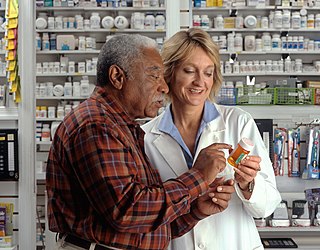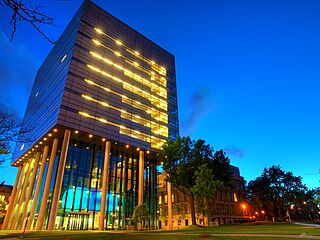Related Research Articles
A bachelor's degree or baccalaureate is an undergraduate academic degree awarded by colleges and universities upon completion of a course of study lasting three to six years. The two most common bachelor's degrees are the Bachelor of Arts (BA) and the Bachelor of Science. In some institutions and educational systems, certain bachelor's degrees can only be taken as graduate or postgraduate educations after a first degree has been completed, although more commonly the successful completion of a bachelor's degree is a prerequisite for further courses such as a master's or a doctorate.

A pharmacist, also known as a chemist or a druggist, is a health professional who specializes in the preparation, properties, effects, interactions and use of medicines. The pharmacist provides pharmaceutical care to patients, as well as basic primary health care services. Using knowledge of the mechanism of action of drugs, the pharmacist understands how they should be used to achieve maximum benefit, minimal side effects and to avoid drug interactions. Pharmacists undergo university or graduate-level education to understand the biochemical mechanisms and actions of drugs, drug uses, therapeutic roles, side effects, potential drug interactions, and monitoring parameters. This is mated to anatomy, physiology, and pathophysiology. Pharmacists interpret and communicate this specialized knowledge to patients, physicians, and other health care providers.
A Doctor of Pharmacy is a professional doctorate in pharmacy. In some countries, it is a first professional degree and a prerequisite for licensing to practice the profession of pharmacy or to become a clinical pharmacist. In many countries they are allowed to practice independently and can prescribe drugs directly to patients. A PharmD program has significant experiential or clinical education components in introductory and advanced levels for the safe and effective use of drugs. Experiential education prepares graduates to be practice-ready, as they already have spent a significant amount of time training in areas of direct patient care and research.

Hamdard University is a private research university with campuses in Karachi and Islamabad, Pakistan. It was founded in 1991 by the renowned philanthropist Hakim Said of the Hamdard Foundation. Hamdard is one of the first and the oldest private institutions of higher education in Pakistan. In Karachi, Hamdard University is the largest private research university with a campus area of over 350 acres.
The Master of Sciences of Pharmacy (MPharm) is the standard master's degree program in Pharmacy. It is the oldest honourable Diploma (Degree) authorized from the European Faculties of Pharmacy as it takes five years to complete. It is based on a credit system higher than the normal Bachelor of Pharmacy degree. It is different from the American Pharmaceutical Diploma, Doctor of Pharmacy,(PharmD), that takes 4 years to complete. The Faculty is a member of the Association of European Faculties of Pharmacy and its graduates meet all the requirements for the profession as defined by the European Union. In the initial three years students revise and broaden their knowledge of elementary natural and medical subjects to the level required for understanding specific subjects from the field of Pharmacy. Students attend lectures and seminars and take part in practical pharmacy placements. During the last year of study they work on their thesis. The programme is concluded by defending the thesis and taking the final state examination. Then the students are awarded the master's degree. The study programme is compliant with EU directive 2005/36/EC. Graduates awarded the master's degree can later sit for a thorough state exam including an advanced thesis defence. After passing they are awarded the "Testing Board" degree . Graduates can apply for postgraduate after studying several branches of Pharmacy in the five accredited years. After defending their dissertation, submit their researches in their selected branches of Pharmacy and passing the final state examination they are awarded the degree. The master's program is offered in different specialized areas, one major being Clinical Pharmacy. Clinical pharmacy specialization enables pharmacists to deliver higher levels of clinical services. In some countries these specializations are happening with residency programs.
A Bachelor of Pharmacy is a undergraduate academic degree in the field of pharmacy. In many countries, this degree is a prerequisite for registration to practice as a pharmacist. Since both PharmB and PharmD are prerequisites to license in most western countries they’re considered equivalent. In many western countries, the foreign graduates with BPharm, PharmB or BS Pharm practice similarly as PharmD graduates. It is analogous to MBBS vs. MD where MBBS is foreign equivalent of MD. It is training to understand the properties and impacts of medicines and developing the skills required to counsel patients about their use.

The University of Georgia College of Pharmacy is a college within the University of Georgia (UGA) in Athens, Georgia, United States.

The University of Kentucky College of Pharmacy is a college of pharmacy located in Lexington, Kentucky. In 2016, U.S. News & World Report recognized the UK College of Pharmacy as one of the nation's top ten pharmacy programs.

The Campbell University College of Pharmacy & Health Sciences is an American pharmacy school founded in 1985 by Dean Ronald Maddox and located in Buies Creek, North Carolina. The College is one of seven schools that compose Campbell University. In 2009, the school's name was changed to Campbell University College of Pharmacy and Health Sciences.
College of Pharmacy is part of the University of Arizona, a public university in Tucson, Arizona. It is the only pharmacy school at a public Arizona university and one of four health professions colleges at the Arizona Health Sciences Center campus. The college is accredited by the Accreditation Council for Pharmacy Education.
The basic requirement for pharmacists to be considered for registration is an undergraduate or postgraduate pharmacy degree from a recognized university. In many countries, this involves a four- or five-year course to attain a master of pharmacy degree (MPharm). In the United States of America, students graduating after January 1, 2003, must complete a doctor of pharmacy degree to become a licensed pharmacist. This same requirement has been coming into place in other countries such as Canada and France.

The University of Florida College of Pharmacy is the pharmacy school of the University of Florida. The College of Pharmacy was founded in 1923 and is located on the university's Gainesville, Florida main campus. The college offers the entry-level Doctor of Pharmacy (Pharm.D.) degree as the first professional degree for students entering the profession. The college offered a Working Professional Pharm.D. (WPPD) program for bachelor's-trained pharmacists already in practice with its last cohort of students enrolled in 2016. Additionally, various graduate degrees are offered. The professional program is fully accredited by the American Council on Pharmaceutical Education. Since 2011 the college has been offering online degree programs at the graduate level, such as the Forensic Science Program, Pharmaceutical Chemistry Program and Clinical Toxicology Program. In total the College of Pharmacy received over $28.3 Million in total Research Revenues in 2019.
The academics of the University of Southern California center on The College of Letters, Arts, and Sciences, the Graduate School, and its 17 professional schools.
The Skaggs School of Pharmacy and Pharmaceutical Sciences is a graduate-level pharmacy school at the University of California, San Diego. It offers five educational programs:

The Leslie Dan Faculty of Pharmacy is a pharmacy school and an academic division of the University of Toronto. The faculty is located on the northwestern corner of College Street and University Avenue, placing it across from the Ontario Legislative Building and at the entrance to Queen's Park station. It is also situated 1-2 blocks away from four internationally renowned hospitals — The Hospital for Sick Children, Princess Margaret Cancer Centre, Toronto General Hospital and Mount Sinai Hospital. It is part of Toronto's Discovery District.

UIC College of Pharmacy at the University of Illinois Chicago is one of the oldest pharmacy schools in the US, and oldest unit of the University of Illinois system.

The University of Health Sciences is a public university offering degrees in health sciences in Phnom Penh, Cambodia.

Kanak Manjari Institute of Pharmaceutical Sciences, also known as KMIPS, is a well-known pharmaceutical sciences institute in the Indian State of Odisha. It was established in 1982 in Chhend Colony, Rourkela to teach Pharmaceutical Sciences and to award diplomas as well as undergraduate and postgraduate degrees to students around the state.
Ramaiah University of Applied Sciences (RUAS) is a UGC approved Private University in India.It was created by an act in the State of Karnataka, India and was established in December 2013.

The USC School of Pharmacy is the pharmacy school of the University of Southern California, originally established in 1905 as USC College of Pharmacy. In 1918, it created the four-year Bachelor of Science in pharmacy degree program. In 1950, it established the nation's first Doctor of Pharmacy (PharmD) program. The School offers numerous dual- and joint-degree programs in such fields as law, business, public health, regulatory science, healthcare decision analysis, and gerontology. The School launched the nation's first PharmD/MBA dual degree in 1990, the first PhD in pharmaceutical economics and policy in 1994, the first professional doctorate in regulatory science in 2008, and a translational science graduate program that merges science with clinical expertise. The School is led by Dean Vassilios Papadopoulos.
References
- 1 2 3 4 5 "Faculty of Pharmacy and Pharmaceutical Sciences", University of Alberta Centenary, University of Alberta. Accessed February 1, 2014.
- ↑ "Passion for Life". University of Alberta Alumni Association, Autumn 2001.
- ↑ http://www.pharm.ualberta.ca/About_the_Faculty.aspx [ dead link ]